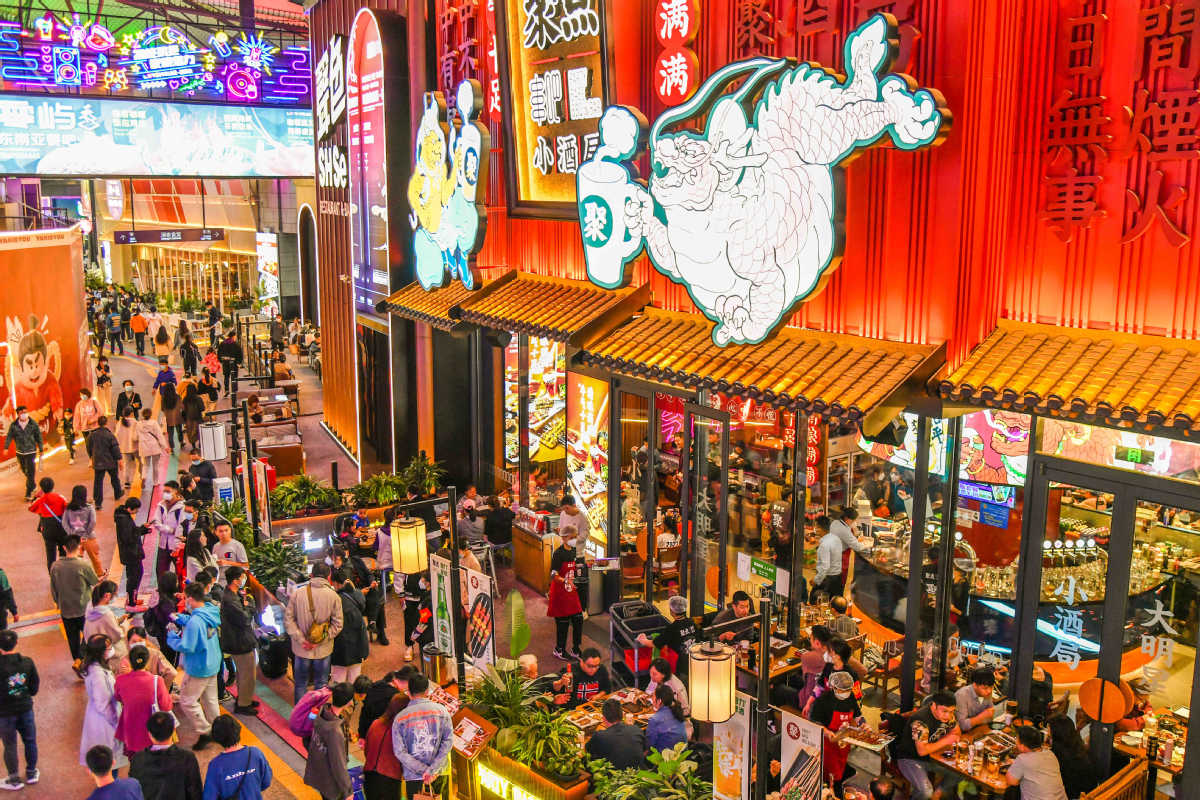Catering sector bounces back from shutdowns


Customers return after COVID-19 takes financial toll
One of the most frequent review hashtags for Peijie Hotpot's two branches in Beijing on the restaurant-rating app Dazhongdianping is "long queue".
The outlets, located in Chaoyang district's Sanlitun and Shuangjing areas, have only been open for a month, but they have rapidly gained popularity among young people. During weekends, customers wait at least two hours to get a table at either branch.
Yan Dongsheng, founder of the business — one of the most popular hotpot chains in Chongqing, with some 60 branches nationwide — said he planned to enter the Beijing market last year.
"The aim was to open three to five branches in the capital this year, but because of the COVID-19 pandemic, we finally opened only two," he said, adding that he is happy to see both outlets attracting long lines of customers since they first opened.
As the pandemic situation is relatively stable, customers are becoming more positive toward food and beverage consumption. As the catering sector slowly recovers, restaurant owners plan to open new branches, while chefs continue to explore new dishes and menus.
Even though new waves of the pandemic occasionally emerge in cities across China, restaurateurs are doing their best to adapt to the situation by exploring fresh business opportunities, especially expanding their online trade.
Yan said that in May, when the management team at Peijie Hotpot's first store in Hangzhou, capital of Zhejiang province, was preparing for the outlet to open, the team members were locked down in Shanghai due to the pandemic.
"We pulled in teams from all over the country for the Hangzhou branch opening. During a trial operation, long lines formed outside the outlet. On opening day, 2,000 groups of customers were waiting in line for a table," Yan said.
He added that table turnover at the Hangzhou branch is the best among all Peijie Hotpot outlets.
Yan feels that due to its spicy flavors, Chongqing-style hotpot has become a popular choice for Generation Z (those born in the late 1990s or early this century), but adds that the domestic spicy hotpot market is competitive.
"Some businesses are focusing on creating new dishes, some on innovative soup bases. We insist on the authentic Chongqing hotpot soup base, which originates from my grandmother's recipe," he said, adding that Peijie Hotpot's soup base is made after 240 hours of natural fermentation and nine hours of simmering.
In addition to bringing fresh ingredients from Chongqing to its branches across the country, Peijie adds local ingredients to its menu, such as lamb in Beijing and bullfrog in Shanghai.
Outbreaks of COVID-19 in different cities spurred Yan's team to launch more business online, including operating a takeaway platform and running online communities.
Yan's team also sells through livestreaming, which now comprises 15 percent of e-commerce turnover at the business.
He said he plans to expand in many other cities, including Suzhou and Wuxi, Jiangsu province, Kunming, Yunnan province, and Xi'an, Shaanxi province. "My goal is to bring Chongqing's spiciness to the world," Yan said.
The food and beverage industry rebounded during the National Day holiday this year.
According to on-demand services platform Meituan, during the holiday week, the number of online pre-orders at restaurants rose by 87.6 percent year-on-year.
In Henan, the Department of Commerce said sales for the province's restaurant industry on Oct 1 — National Day — rose by 328 percent compared with the same day in 2020.
According to a report on Shanghai's consumer market during the National Day holiday issued by the city's Municipal Commission of Commerce, from Sept 30 to Oct 6, food and beverage consumption in the metropolis rose significantly, reaching 6.96 billion yuan ($959 million), up by 18 percent year-on-year.


















